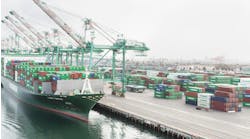Download this article in PDF format.
With supply chain disruptions impacting businesses, consumers, economies and entire industries right now, President Joe Biden has proposed a new way to speed up the delivery of goods in the US: a 24/7 supply chain operation. The initiative is taking root at the Ports of Los Angeles and Long Beach—where ships sit at anchor for days or even weeks waiting to enter the port for cargo unloading—but may also include some of the nation’s largest transportation and logistics providers.
In a recent briefing, Biden said it took weeks of negotiation with a union, retailers and freight movers to get the ports to begin operating 24 hours a day, seven days a week. “This is the first key step toward moving our entire freight transportation and logistical supply chain, nationwide, to a 24/7 system,” he said in his briefing.
Usually open during the week and then closed at nights and on weekends, these two important ports will now be open more than 60 additional hours every week. This will nearly double the amount of time that the port is usually open during more “normal” operating circumstances.
Operating at night presents additional benefits, and particularly in populated regions like Los Angeles. “The night hours are critical for increasing the movement of goods because highways are less crowded at night,” Biden pointed out. “In fact, during off-peak hours in Los Angeles, cargo leaves the port at a 25% faster pace than during the day shift.”
The 24/7 Supply Chain Comes into Focus
To create a truly 24/7 supply chain that helps alleviate or at least relieve the current supply chain snarls, Biden is also calling on large retailers and transportation companies to rethink the way they hire trucks and railcars to move their goods. He said Walmart has committed to moving products 24/7 from ports to its stores across the nation, and that the large retailer is upping its use of off-peak hours by 50% in the coming weeks.
Target, Home Depot and Samsung have also committed to ramping up their activities to utilize more off-peak hours at the nation’s ports. FedEx and UPS are also onboard with the idea, having committed today to “significantly increasing” the amount of goods they move at night, and with the goal of getting goods onto store shelves faster. Combined, these two carriers move about 40% of the nation’s packages.
Biden characterizes this participation and willingness to ramp up operations to ease supply chain shortages as a good first step in the right direction. “This is a big first step in speeding up the movement of materials and goods through our supply chain,” he said in his briefing. “But now we need the rest of the private sector chain to step up as well.”He’s referring to the terminal operators, railways, trucking companies, shippers and other retailers that play important roles in supply chains—those critical networks whose profiles have risen considerably due to the early pandemic-driven outages and subsequent material bottlenecks.
Some Progress is Being Made
The around-the-clock supply chain strategy may already be having a positive impact on the current situation. According to CNN, the Port of Los Angeles has made “some progress”
moving shipping containers off the docks since the White House announcement was made. “We had 25% of all cargo on our dock sitting here for 13 days or longer and that’s been cut in just about half over the last week,” the port’s executive director told CNN.
Although the port is ready to operate around the clock, its terminals, which are privately owned and operated, remain closed from 3 a.m. to 8 a.m. because there are no businesses calling on the ports in those hours seeking to pick up their containers.
“Currently there seems to be no cargo owners who are looking to use the 3 a.m. to 8 a.m. window,” Phillip Sanfield, director of media relations for the port, told CNN. “Terminals don’t want to be open if there is no interest in using the gates. We’re not yet seeing demand by cargo owners to come get their cargo during the overnight hours.”









